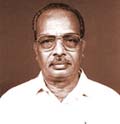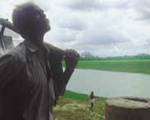| EASTERN
COASTAL PLAIN |
Professor
A Vaidyanathan
Professor Vaidyanathan is an eminent agricultural
scientist, whose area of specialisation is management of tanks.
He led the study conducted by the Madras Institute of Development
Studies, that has made a case for the renovation of tanks, traditionally
managed by the communities in South India to mitigate water
crisis in urban as well as rural areas. Vaidyanathan=92s publication,
Tanks of South India, that takes an in-depth look at these issues
has wide acclaim. At present, he is the chairperson of the Tamil
Nadu unit of the National Water Harvester's Network. Formerly,
he held the post of chairperson, government of India, Planning
Commission Committee on Irrigation Pricing (1992) and Member,
government of TamilNadu, High Power Committee on
Wasteland and Watershed Development (1996) as well as Chairperson,
Indian Society of Agricultural Economics. He has written books
like India's Agricultural Development in a Regional Perspective,
Performance of Indian agriculture since Independence in Agrarian
Questions: Water and Resources Management: Institutions and
Irrigation in India by Kaushik Basu (ed.).
For details:
Professor A Vaidyanathan
B-1 Sonali Apts
11 Beach Road
Chennai 600090
Ph: (044)24919607
C
R Shanmugam
C R Shanmugam, a civil engineer, works as a project consultant
for Dhan Foundation, a Madurai-based NGO. He has revived about
20,000 300-1,000-year-old water tanks, which are now managed
by people in villages across Tamil Nadu. The tanks recharge
groundwater, besides ensuring water for irrigation. "A
man with a vision and wisdom" is what people say about
him. But, in all humility, Shanmugam believes he is "only
a cog in the wheel". |
|
|
 Devendra Devendra
Devendra, who is in his 60s, is the president of the Kedar Village
Tank Farmers Society in Tamil Nadu. The society was formed in
1989 and there are around 217 members working with it from 13
different communities. The society operates and irrigates an
area of approximately 119 hectares. The Centre for Water Resources,
Anna University, gave the society Rs 27.6 lakh for research
in 1990. After forming the society, they collected Rs 40,000
as seed money and the government also pitched in with a grant
of Rs 50,000 for the work. The society designed the structures
themselves and constructed a 1.5 km long road all along the
canal to maintain it and also to mobilise their vehicles and
machines for their fields. This reduced the cost of transportation
and the villagers could save 50 per cent of the cost of harvesting.
Initially, the society collected money from the villagers.
Then the Irrigation Management Training Institute, Trichi,
gave them a generous grant, which the society has kept in
a fixed deposit and the interest on it is used for maintenance
purposes, which comes to about Rs 30,000 a year.
Devendra says, "Before the intervention of the society,
small farmers did not get water because big land owners took
a long time to irrigate their land. The society intervened
and constructed an earthen sub-channel so that the water reaches
both the small and big landowners."
Initially, the society did face difficulties. Water channels
were being damaged. This was checked by the active cooperation
of local people who fixed a fine of Rs 100 for such irresponsible
acts.
People reported an increase in the productivity of their
lands due to the availability of water even during the drought
period. This has drastically changed their economic status.
|
|
|
E R R Sadasivam
E R R Sadasivam is the owner of a 'tree museum' in Elur village
in Coimbatore district of Tamil Nadu. Spread over 30 ha, the
museum houses over 100 species of trees and also hyenas, wild
cats, jackals and peacocks. When he inherited this property
in 1950, it was just a barren patch of land. It was his hard
work, with the assistance of the villagers, that transformed
it into what it is today. 112 villages are now enjoying the
benefits of this hard work, with all the barren land being converted
to woodlands, and that too, without any financial assistance.
For Sadasivam, profit is not the driving force. According to
him, happiness lies in making people understand the value of
trees. To his peers, he is a 'national asset', and rightly so. |
|
|
 Ganesan
Ganesan
|
Ganesan
Ganesan manages the water supply of Madaivini Patti, a tiny
locality on the outskirts of village Vairavan Patti in Madurai
district, Tamil Nadu. He is a neerkatti (irrigator).
Ganesan believes that if effective, kanmoy (tank) management
is crucial to social harmony. He knows the topography of his
village at the back of his hands. He knows exactly where the
water comes from and where it should go. He knows the water
needs of each and every farmer. He maintains the kanmoy embankments
and operates the sluice valves that release water in the channels.
Ganesan is poor. In exchange for maintaining the channels and
the kanmoy, he receives rice from each farmer in proportion
to the field size (4.5 kg of rice per 60 cents of crop area).
In addition, he gets 4 kg of rice from each farmer for operating
the sluice valves. For Ganesan, however, work in the village
is restricted to the monsoon. For the rest of the year, he has
to look for daily wage work either as an agricultural labourer
or as a loader in the nearby towns. Sometimes he manages Rs
50 a day, sometimes even less than that.
Ganesan's two sons and four daughters are not interested in
carrying on with the neerkatti tradition. But as long
as there are paddy fields, the limited water will need to be
managed with care. There will have to be a neerkatti. |
|
|
Vasimalai
M P
M.P. Vasimalai is Executive
Director of a national NGO, Professional Assistance for
Development Action (PRADAN) in India. After his graduation
in Agronomy, he served for two years on an irrigation
research program with Tamil Nadu Agricultural University.
Subsequently, he completed management studies at the Indian
Institute of Management, Ahmedabad. He worked with a Gandhian
NGO to actualize the self-governance of villages by promoting
people organizations and facilitating the implementation
of poverty alleviation programs by village assemblies.
He was involved in enhancing the capacity of NGOs in natural
resource management for more than a decade. He is a member
of a national advisory committee to the Water Resources
Ministry whose goal is to build farmers' stakes in Government
programs. He is currently involved in Institutional development
of people-based economic organisations. He provided
advice to field operations in natural resource management
enterprise
promotion and rural women's credit programs.
Meet Urban
water harvesters |
<<back
|
|






